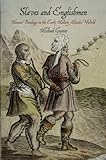Slaves and Englishmen : Human Bondage in the Early Modern Atlantic World / Michael Guasco.
Material type: TextSeries: The Early Modern AmericasPublisher: Philadelphia : University of Pennsylvania Press, [2014]Copyright date: ©2014Description: 1 online resource (328 p.) : 8 illusContent type:
TextSeries: The Early Modern AmericasPublisher: Philadelphia : University of Pennsylvania Press, [2014]Copyright date: ©2014Description: 1 online resource (328 p.) : 8 illusContent type: - 9780812245783
- 9780812209884
- 306.3/62 23
- online - DeGruyter
- Issued also in print.
| Item type | Current library | Call number | URL | Status | Notes | Barcode | |
|---|---|---|---|---|---|---|---|
 eBook
eBook
|
Biblioteca "Angelicum" Pont. Univ. S.Tommaso d'Aquino Nuvola online | online - DeGruyter (Browse shelf(Opens below)) | Online access | Not for loan (Accesso limitato) | Accesso per gli utenti autorizzati / Access for authorized users | (dgr)9780812209884 |
Browsing Biblioteca "Angelicum" Pont. Univ. S.Tommaso d'Aquino shelves, Shelving location: Nuvola online Close shelf browser (Hides shelf browser)

|

|

|

|

|

|

|
||
| online - DeGruyter Domestic Intimacies : Incest and the Liberal Subject in Nineteenth-Century America / | online - DeGruyter Police Power and Race Riots : Urban Unrest in Paris and New York / | online - DeGruyter Human Rights as War by Other Means : Peace Politics in Northern Ireland / | online - DeGruyter Slaves and Englishmen : Human Bondage in the Early Modern Atlantic World / | online - DeGruyter Backroads Pragmatists : Mexico's Melting Pot and Civil Rights in the United States / | online - DeGruyter The Evolution of International Human Rights : Visions Seen / | online - DeGruyter Ovid's Erotic Poems : "Amores" and "Ars Amatoria" / |
Frontmatter -- Contents -- Introduction. The Problem of Slavery in Pre- Plantation America -- Chapter 1. The Nature of a Slave: Human Bondage in Early Modern England -- Chapter 2. Slaves the World Over: Early English Encounters with Slavery -- Chapter 3. Imaginary Allies: Englishmen and Africans in Spain's Atlantic World -- Chapter 4. Englishmen Enslaved: The Specter of Slavery in the Mediterranean and Beyond -- Chapter 5. "As Cheap as Th ose Negroes"?: Transplanting Slavery in Anglo- America -- Chapter 6. Slavery before "Slavery" in Pre- Plantation America -- Conclusion -- Notes -- Index -- Acknowledgments
restricted access online access with authorization star
http://purl.org/coar/access_right/c_16ec
Technically speaking, slavery was not legal in the English-speaking world before the mid-seventeenth century. But long before race-based slavery was entrenched in law and practice, English men and women were well aware of the various forms of human bondage practiced in other nations and, in less systematic ways, their own country. They understood the legal and philosophic rationale of slavery in different cultural contexts and, for good reason, worried about the possibility of their own enslavement by foreign Catholic or Muslim powers. While opinions about the benefits and ethics of the institution varied widely, the language, imagery, and knowledge of slavery were a great deal more widespread in early modern England than we tend to assume.In wide-ranging detail, Slaves and Englishmen demonstrates how slavery shaped the ways the English interacted with people and places throughout the Atlantic world. By examining the myriad forms and meanings of human bondage in an international context, Michael Guasco illustrates the significance of slavery in the early modern world before the rise of the plantation system or the emergence of modern racism. As this revealing history shows, the implications of slavery were closely connected to the question of what it meant to be English in the Atlantic world.
Issued also in print.
Mode of access: Internet via World Wide Web.
In English.
Description based on online resource; title from PDF title page (publisher's Web site, viewed 30. Aug 2021)


